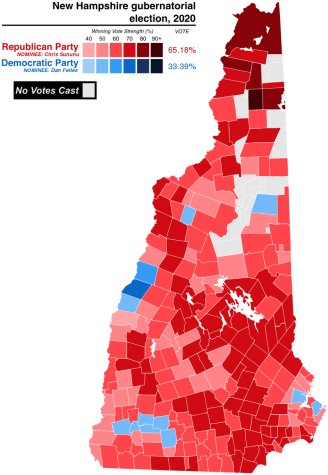Recent Updates in Key 2022 Races
Developments in two upcoming midterm races could disrupt the balance of power that both parties are battling over.
November 22, 2021
The 2022 midterms have devolved into a desperate political board game with no clear advantage for either party in a tied Senate, a nearly even House, and a collection of competitive governor elections in bellwether swing states across the country. Two already competitive races became more contentious in the last two weeks when one politician joined one race and another one declined to run in the other, and Republicans’ attempts to win back majorities in Congress as well as keep gubernatorial strength have been complicated.
The first of these turn of events occurred in the obscure battleground state of Texas whose upcoming governor election underwent a rapid transformation from a likely Republican hold to a competitive race in a matter of days. The race began to change in recent weeks after hints appeared that Beto O’Rourke might enter the race and an official announcement was released on Monday saying he planned to oppose incumbent Republican Greg Abbott in 2022, and O’Rourke’s popularity combined with his fundraising capabilities in Texas may make him Democrats’ best chance of ousting Abbott. Until his announcement, the race was thought to be a foregone conclusion in favor of Republicans due to their longstanding hold on the Texas governorship, and the last few decades of statewide Texas races portray an electorate that leans strongly toward the right.
Yet this is an electorate that has encountered population shifts favorable to Democrats in recent years, leading to doubts about where in the future the state will stand on the political spectrum and whether the votes might be there for Democrats to win on statewide ballots. While always voting red, presidential results have displayed a steady decrease in Republican’s margins over the past few cycles, changing from 15.8% to 9.0% and then to 5.6% in 2012, 2016, and 2020 respectively, and in 2018 the incumbent Republican Ted Cruz beat Beto O’Rourke in the Senate election by a mere 2.6%.
However, the 2018 midterms were marked by a substantial blue wave that swept through suburbs across the nation and knocked forty-two districts out of Republicans’ hands, two of them located in Texas itself, and Democratic margins increased by about 10% on average in districts across the country. Of all years, 2018 may have been the best chance for Democrats to flip the state but Beto O’Rourke still fell short, a possible testament to Republican strength in Texas.
Donald Trump may have played a role in the blue surge seen in Texas in the last decade with much of this shift occurring in areas surrounding cities like Houston and Dallas, as this was part of a broader nationwide phenomenon of suburban voters being repelled by Trump and shifting to the left. This trend continued from 2016 to 2020 but seemed to somewhat reverse itself in the recent 2021 elections when Trump was gone, and if Trump is again off the ballot and out of popular politics in 2022, the state could potentially lose its battleground status if suburbs move back towards the right. Combined with this, Republicans’ would have an even greater advantage if Latino voters retain the rightward shift they made in 2020. But regardless of which party wins in Texas next November, either outcome would provide some clarity to the decade-long question of whether Texas can turn blue in the near future.
In his announcement video, O’Rourke cited last February’s power failure resulting from a winter storm as a factor driving his candidacy, describing his dismay when Texans were “abandoned by those who were elected to serve” them as well as his frustration with a deeper problem of Republican politicians no longer “paying attention to and trusting the people of Texas”. O’Rourke criticized Republicans’ stances on issues such as abortion and gun control as “extremist”, and condemned them for not focusing on issues “that most of us agree on” like healthcare. Greg Abbott’s campaign has painted O’Rourke as a progressive radical whose pro-Biden policies would be damaging to the people of Texas, and tying O’Rourke to Washington may prove valuable for Abbott given Biden’s current disapproval.

Distaste for Washington became a factor in another upcoming midterm election, way up north in New Hampshire where incumbent Democrat U.S. Senator Maggie Hassan is up for reelection in a race thought to be one of the best chances for Republicans to gain a seat and take control of the Senate. Speculation that current New Hampshire Governor Chris Sununu, a popular Republican who won reelection by a 2-1 margin last year, might run against Hassan fueled Republican optimism in light of the lead he held in hypothetical polls by the University of New Hampshire and Saint Anselm College. Yet this enthusiasm vanished last week when Sununu announced at a press conference that he would not challenge Hassan, instead opting to run for another term as governor where he “can be the most impactful” and work with citizens “one-on-one”. Sununu expressed dislike for the “gridlock and politics of Washington” where “too often doing nothing is considered a win”, and argued that the governorship allowed for a greater impact on the people of New Hampshire which is his true purpose in politics.
The decision surprised many in both parties, but Republicans were especially shocked by Sununu’s apparent dismissal of what seemed like a golden opportunity to flip a vulnerable seat in a political environment already hostile to Democrats, and Sununu’s enormous 2020 margin combined with Hassan’s 2016 victory by just 1,017 votes made prospects favorable for Republicans. And by many measures New Hampshire is a blue state, one that has not voted for a Republican in presidential contests since George W. Bush in 2000 and also one that Biden comfortably won by 7.35%, and finding another Republican candidate as popular as Sununu is unlikely. In essence, Republicans’ chances of flipping this seat have fallen, and so have their odds of retaking the Senate.
Winning a Senate majority is still an attainable outcome for Republicans, and other Democrat-held seats that could potentially be flipped include Georgia, Arizona, Nevada, and Colorado, and after a close governor election in the solid blue state of New Jersey this month, even Illinois, which was won by a Republican in 2010, could potentially be a target of Republicans if the political climate is favorable enough. But Republicans also must protect a number of competitive seats they currently hold, namely Pennsylvania, Wisconsin, Ohio, and North Carolina, three of which have an incumbent Republican retiring. Amidst this geographical board game of flipping and holding onto Senate seats, a state like New Hampshire could be pivotal, but Republicans may have lost their only edge in the state if Sununu will not run.











